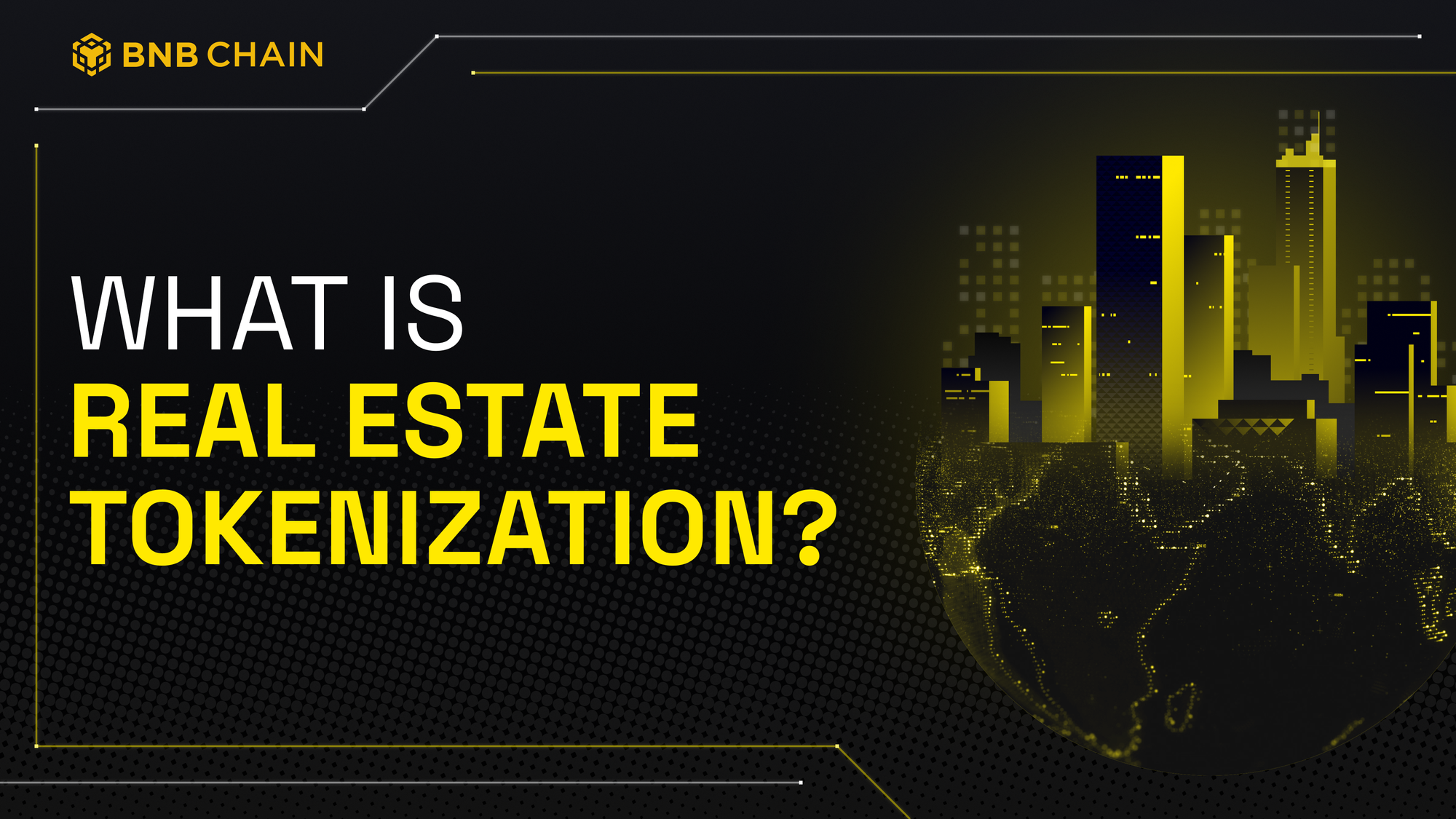Chains
BNB Beacon Chain
BNB ecosystem’s staking & governance layer
Staking
Earn rewards by securing the network
Build
Explore
Accelerate
Connect
Careers🔥
Explore Opportunities on BNB Chain
What Is Real Estate Tokenization?

The global real estate market was valued at $9.8 trillion in 2023 and is expected to hit $14.5 trillion by 2030, at a compound annual growth rate (CAGR) of 6% between 2024 and 2030. Despite its size, the sector is plagued with several problems. The most glaring is that real estate is an illiquid asset requiring considerable capital. Furthermore, transactions often take months to conclude, and market participants could take weeks or months to find a counterparty.
Fortunately, real estate tokenization and the integration of blockchain technology can help overhaul the market by lowering the entry barrier, opening it up to more individuals, and addressing the lack of liquidity and transparency. This article will take a closer look at real estate tokenization, understand how it works, and the benefits it offers.
What Is Real Estate Tokenization?
Real estate tokenization is the process through which a property and its associated cash flows are digitally represented on the blockchain as tokens. This helps increase liquidity, streamline processes, and enable digital ownership of real-world assets. The real estate property is tokenized by dividing it into smaller fractions, and smart contracts are used to define contract specifics and automate certain processes.
How Does It Work?
Real estate tokenization involves converting a property into digital tokens using smart contracts on a blockchain. Each token represents a fraction of the property's value, allowing investors to own a portion without purchasing the entire asset. Property owners can tokenize commercial, residential, or trophy assets, enabling fractional ownership and making investments more affordable for a wider audience.
For instance, a property owner with a $100,000 asset can create 1,000 tokens, each valued at $1,000, to raise funds without selling the entire property. Investors can buy these tokens, gaining partial ownership and rights to profits or losses associated with the asset. Tokenization facilitates liquidity, as these tokens can be traded in secondary markets and enable property owners to unlock value without compromising their long-term ownership goals.
Trophy assets, such as iconic buildings, vineyards, or rare riverbanks, can also be tokenized, democratizing access to high-value investments. Tokenization extends beyond physical property to include collateralized debt, equity interests, or portions of deeds, providing flexibility for investors and property owners.
What Are The Benefits Of Real Estate Tokenization?
Real estate tokenization offers several benefits for a sector struggling with liquidity and transparency issues. Let’s take a look at some of the benefits.
Allows Small Investors To Invest
Real estate investments require large amounts of capital, often available only to the ultra-rich, discouraging smaller investors who don’t have deep pockets to get involved. Tokenization has helped make it more accessible to small-scale and retail investors, allowing it to be tokenized into smaller fractions and making them more accessible.
Low Counterparty Risk
Before tokenization, real estate transactions often involved third parties, leading to complications and a lack of transparency. Smart contracts can mitigate third parties, minimize human interaction, shorten the chain of transactions, and eliminate all risks associated with counterparties and weak links.
Greater Liquidity
The real estate market has always been plagued by low liquidity, with investors hesitant to get into it because of liquidity problems. Real estate tokenization has helped the industry overcome this issue through fractionalization. Fractionalizing a piece of real estate improves liquidity because instead of attempting to sell the property as a whole, owners of tokens representing the asset can sell them quickly and facilitate a quick change of ownership.
Greater Transparency And Efficiency
Blockchains are decentralized, ensuring transparent, immutable transactions ideal for real estate. Smart contracts streamline processes, reducing human interference and eliminating complex paperwork, making transactions faster and more efficient. Unlike traditional methods, blockchain operates 24/7, allowing transactions to occur at any time with full transparency.
How Can I Tokenize Real Estate
BNB Chain offers an efficient way to tokenize real estate, making it accessible to a broader audience while improving liquidity and transparency. Its user-friendly platform removes the need for coding expertise, empowering property owners, entrepreneurs, and businesses to easily convert real estate into digital tokens.
Using BNB Chain’s Real-World Asset (RWA) Tokenization feature, property owners can create tokens that represent fractions of their real estate assets. These tokens are securely issued on the BNB Chain, enabling faster transactions and enhanced liquidity through fractional ownership. By leveraging BNB Chain’s decentralized network, property owners can also ensure round-the-clock transparency and reliability for all transactions.
BNB Chain’s tokenization solution simplifies a traditionally complex process, helping unlock the potential of real estate assets in the digital economy. Whether it’s for raising funds, increasing liquidity, or attracting small-scale investors, BNB Chain provides the tools needed to make real estate tokenization accessible and efficient.
In Closing
Despite its relative inaccessibility and problems with liquidity, real estate has always been a highly coveted investment. Real estate has seen a jump in liquidity and become more accessible to small investors due to affordable prices facilitated by tokenization. The tokenization of real-world assets will increase significantly as regulatory issues are ironed out. However, while real estate tokenization may require specific legal requirements, it will ultimately offer several advantages, such as improved accessibility, liquidity, and fractional ownership.
Follow us to stay updated on everything BNB Chain
Website | Twitter | Telegram | Facebook | dApp Store | YouTube | Discord | LinkedIn | Build N' Build Forum